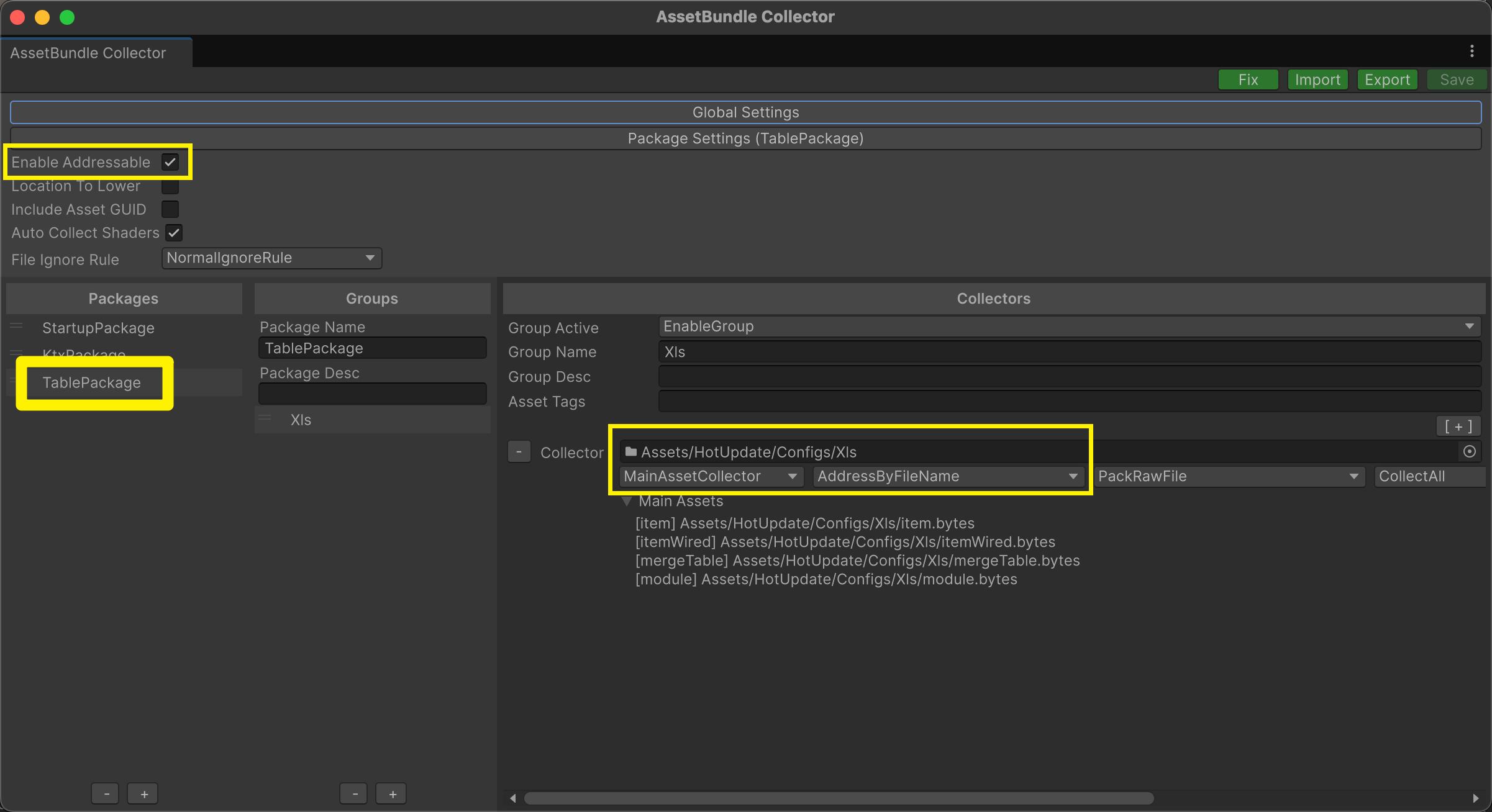Unity Example
This example shows the YooAsset + HybridCLR hot update table solution. Also, there is a solution for customizing the buffer loading logic.
Unity Project Dependencies
- YooAsset 2.3.x: Configure according to the official tutorial.
- UniTask: Install into the project via UPM.
- FlatBuffers v25.2.10: Copy the .cs files from the net/FlatBuffers folder into the project.
Example Unity Project Structure:
Asset/
├── HotUpdate/
│ └── Configs/
│ │ └── Xls/ # Binaries generated by x2f
│ └── Scripts/
│ ├── GameLogic/ # Game logic
│ └── Xls/ # Code generated by x2f
└── Plugins/
├── FlatBuffers/ # FlatBuffers library
└── UniTask/
Data Standards
- Must configure
idfield for data indexing, and the type must beint.
Table Generation Commands
The following commands use macOS/Linux/WSL as examples, using backslash \ as line continuation
For Windows PowerShell, use ` as line continuation
CMD doesn't support line continuation, you can write a bat script and use ^ for line continuation.
-
Incremental Table Generation
x2f ./example/batchConvert \
-o "/Path/To/Output" \
--output-bin "/UnityProject/Assets/HotUpdate/Configs/Xls" \
--output-csharp "/UnityProject/Assets/HotUpdate/Scripts" \
-n Xls \
--binary-extension bytes \
--data-class-suffix DataInfo \
--csharp \
--csharp-unity-loader \
--csharp-unity-loader-suffix "" \
--table-class-suffix Table -
Full Table Generation
x2f ./example/batchConvert \
-o "/Path/To/Output" \
--output-bin "/UnityProject/Assets/HotUpdate/Configs/Xls" \
--output-csharp "/UnityProject/Assets/HotUpdate/Scripts" \
-n Xls \
--binary-extension bytes \
--data-class-suffix DataInfo \
--csharp \
--csharp-unity-loader \
--csharp-unity-loader-suffix "" \
--table-class-suffix Table \
--disable-incremental
Above, we swapped the default values of tableClassSuffix and csharpUnityLoaderSuffix to make the interface code more concise.
Using YooAsset to Package Binaries
- Create a resource package named
TablePackage.
AssetBundle Collector:

- Enable
Enable Addressable - Use
AddressByFileNameaddressing mode
Coding Example
async void Start()
{
// Use your own encapsulated method to load TablePackage
await AssetLoader.DownloadPackageAsync("TablePackage");
// Load single tables
await Xls.Item.Instance.LoadAsync();
await Xls.Module.Instance.LoadAsync();
// Load tables configured with merge field in $tables.xlsx through merge table interface
await Xls.MergeTableLoader.LoadAllAsync();
// This line is equivalent to the two lines above that separately load item and module, see implementation in MergeTableLoader.cs
// Get single row data
var item = Xls.Item.Instance.Get(101);
Debug.Log(item.HasValue ? item.Value.Name : "Nope");
Debug.Log($"name: {Xls.Item.Instance.Get(101)?.Name}");
Debug.Log($"name: {Xls.Item.Instance.Get(1)?.Name}");
// Get all data
var items = Xls.Item.Instance.GetAll();
foreach (var itemDataInfo in items)
{
Debug.Log($"id: {itemDataInfo.Id} name: {itemDataInfo.Name}");
}
// Get data pointed to by constant definition
if (Xls.Module.Instance.TryGet(Xls.ModuleConst.CHAT_PANEL, out var module))
{
Debug.Log(module.Name);
}
else
{
Debug.LogError("Cant find chat panel");
}
await Xls.Domain.Instance.LoadAsync();
// Expose FlatBuffers Root for directly calling Root object interfaces
var google = Xls.Domain.Instance.Root.DomainDataInfosByKey("google");
Debug.Log(google.HasValue ? google.Value.Ip + google.Value.Port : "Nope");
}
Strict Verification Identifier STRICT_VERIFICATION
- When
STRICT_VERIFICATIONis set, it will strictly verify file_identifier and buffer structure duringLoadAsync/LoadAllAsync, throwing an exception if there's a mismatch, otherwise only printing errors to the console.
About Assembly Definition References
- You can create asmdef files for
FlatBuffersandXls, and add references toFlatBuffersandXlsin your project.
Hot Update Suggestions
- When packaging, use
LZ4compression to significantly reduce binary size. - Only hot update the code generated by x2f, such as
Xls.dll. Do not hot updateFlatBuffers.dll, otherwise performance will decrease.
Custom buffer loading logic
If you want to customize the way table data is loaded, you can modify these two code templates under template/unity.
-
Import dependencies
// 👇 Remove or replace with your own dependencies
using YooAsset; -
TableLoaderBase template
template/unity/unityTableLoaderBaseTemplate.csprivate async UniTask<bool> InternalLoadAsync()
{
// Modify the code that gets the binary data
var package = YooAssets.TryGetPackage("TablePackage");
// (...)
try
{
// (...)
// 👇 Assign your binary data to buffer
var buffer = new ByteBuffer(textAsset.bytes);
if (!TableValidator.Validate(
() => VerifyIdentifier(buffer),
() => VerifyBuffer(buffer),
AssetPath))
{
return false;
}
_root = GetTableRoot(buffer);
LoadDataFromTableRoot(_root);
return true;
}
finally
{
// Release resources
_loadingTask = null;
}
} -
MergeTableLoader template
template/unity/unityMergeTableTemplate.cspublic static async UniTask<bool> LoadAllAsync()
{
// (...)
// Modify the code that gets the binary data
var package = YooAssets.TryGetPackage("TablePackage");
// (...)
// 👇 Assign your binary data to buffer
var buffer = new ByteBuffer(textAsset.bytes);
// (...)
}